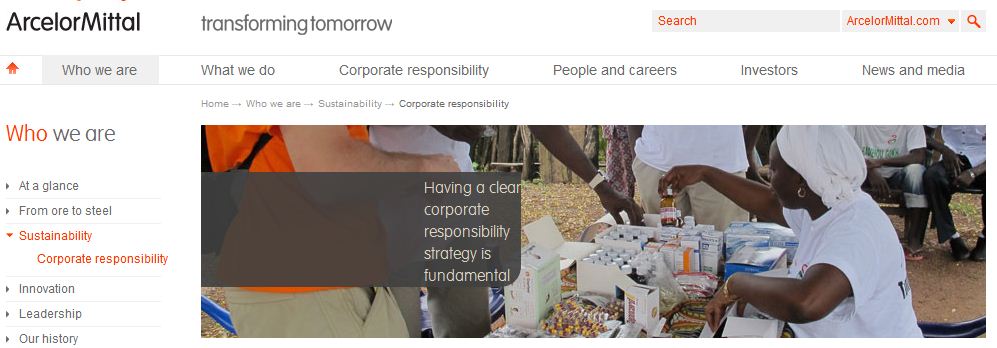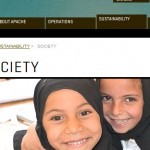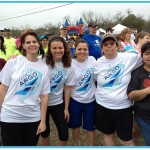ArcelorMittal S.A. steel manufacturing corporation headquartered in Avenue de la Liberté, Luxembourg. It was formed in 2006 from the takeover and merger of Arcelor by Mittal Steel. ArcelorMittal is the world’s largest steel producer, with an annual crude steel production of 93.6 million tones as of 2012. It is ranked 91st in the 2013 Fortune Global 500 ranking of the world’s biggest corporations.
ArcelorMittal was created by the takeover of Western European steel maker Arcelor (Spain, France, and Luxembourg) by Indian-owned multinational steel maker Mittal Steel in 2006, at a cost of €40.37 per share, approximately $33 billion total. Mittal Steel launched a hostile takeover bid which replaced a previous planned merger between Arcelor and Severstal, which had lacked sufficient shareholder approval. The resulting merged business was named ArcelorMittal and is headquartered in Luxembourg.
The resulting firm produced approximately 10% of the world’s steel, and was by far the world’s largest steel company. Total revenues in 2007 were $105 billion. In October 2008, the market capitalisation of ArcelorMittal was over $30 billion.
In December 2008, ArcelorMittal announced several plant closings, including the Bethlehem Steel plant in Lackawanna, New York, and LTV Steel in Hennepin, Illinois.
On 30 June 2010, the European Commission fined 17 steel producers a total of €518 million for running a price-fixing cartel, with ArcelorMittal being fined over €270 million.
On 26 January 2011, the Stainless steel division split off as a new company, Aperam.
In 2012 the company had $22 billion of debt. As of 2012, due to overcapacity and reduced demand in Europe it had idled 9 of 25 blast furnaces; in October 2012 it permanently shut down two blast furnaces at Florange, France.
On October 31, 2012, the company reported a third-quarter loss of $709 million as compared to a $659 million profit for the same period a year ago, citing the slow down in China’s economy.
In January 2013, ArcelorMittal bid $1.5 billion to acquire ThyssenKrupp AG’s rolling mill in Calvert, Alabama, United States. The joint venture with Nippon Steel & Sumitomo Metal Corporation was finalized in February 2014.
In September 2013, the government of Senegal won a court case before an international tribunal to rescind a $2.2 billion deal with ArcelorMittal after the company suspended work on an iron ore mine in the country.
In May, 2014, ArcelorMittal, citing economic self-interest, declared its opposition to sanctions on Russia despite Russia’s invasion and occupation of Crimea and support of militant forces in eastern Ukraine.
Community engagement: ArcelorMittal Serves Under 501C3.
Playing an active role in our communities means understanding what matters to local people and listening to their concerns. This is why we work with local groups to help us prioritise the issues that matter most to them, and invest our time and resources in the best way. We also engage with other stakeholders as part of our overall engagement activities, including non-governmental and governmental organisations.
Investing in our communities
Education
We believe that education is the key tool for individual and community development: a good education equips people to carve out a better life for themselves and to contribute to collective social change. Of the Foundation’s expenditure in 2013, 36% was invested in education projects.
In partnership with the Ministry of Education in South Africa, we have committed to rebuilding 10 schools over a seven-year period. The schools will be refurbished with more sustainable materials such as lightweight steel frames, insulated panels and green technology. In 2013, we handed over the second of these, Mandela Park School, located in Mthatha, in the Eastern Cape, which accommodates 1,200 students. We have also set up science centres in the cities of Vanderbijlpark, Newcastle and Saldanha, which aim to inspire children’s curiosity and interest in the sciences, as well as helping them to pass their school exams.
In Zolowee, Liberia, a town of over 2,500 people in the vicinity of our Tokadeh iron ore mine, we have rebuilt a school for around 220 students who receive their classes here every day. In 2013, we also started the construction of a vocational centre in Yekepa, a town near the mine that was severely damaged during the civil war.
Health
Access to healthcare is a fundamental entitlement of every individual. One of the priorities of the ArcelorMittal Foundation is to safeguard the health of the communities where we work. The Foundation invests in health facilities to strengthen the local medical infrastructure where we have a presence, as well as upgrading obsolete medical equipment and providing much needed healthcare. The Foundation focused 12% of its grants in 2013 on health projects.
The Foundation promotes the exchange of best practice across the globe. For example, in several countries of the Americas – Argentina, Brazil, Mexico, Trinidad & Tobago and Venezuela – the Foundation supports a project Seeing is Believing, which focuses on testing children’s eyesight. Detecting and addressing problems with children’s sharpness of vision are key to supporting pupil performance at school. This project benefited 16,812 children in 2013.
Besides the social and economic impacts of our business, we aim to make a positive contribution to the social development of the areas around our operating sites through the work of the ArcelorMittal Foundation. In 2013, over three million people benefited from 558 projects supported by the Foundation in communities surrounding our steel plants and mines.
The ArcelorMittal Foundation was set up in 2007 to coordinate the company’s community investment activities. Through the work of the Foundation, we aim to align the support we provide with the needs of our local stakeholders in 29 countries where ArcelorMittal has a major presence. So our focus is on the communities around or close to our operations and, through a range of specific initiatives, our employees are often closely engaged in the work of the Foundation. In 2013, the Foundation invested $32.7 million in community projects.
We work with a range of local partners to understand our communities’ social and cultural issues, and all our projects are community-based. We also collaborate with international organisations, such as Junior Achievement, Habitat for Humanity or the International Research Group on Haematopoietic Cell Transplantation to simultaneously develop the same project in different countries.
Projects are coordinated at a local level by our network of Foundation correspondents, based in our major business units, who are responsible for the implementation of our activities in their area. We have a clear methodology to guide every project, which we adapt to regional circumstances.
The work of the ArcelorMittal Foundation focuses on three key areas: education, health, and community development. We also work to support communities facing emergency situations.
Emergencies
The Foundation also offers immediate and urgent help to communities affected by emergencies. Following storm ‘Manuel’ in Mexico in September 2013, for example, we mobilised an emergency aid initiative with donations in kind to the affected communities and families along the coast of Michoacán through the Municipality of Lázaro Cárdenas and our NGO partner ChildFund Mexico.
To help rebuild the damaged roads of the city, ArcelorMittal also donated 20,000 cubic metres of slag – equivalent to 1,430 dump trucks – and a loader, two dump trucks and other vehicles to clean the accumulation of waste in La Mira.
In Romania, we also distributed the materials donated by colleagues and by the company to worst-hit areas in the north of Galati county, where many of our employees live. Again, the Foundation coordinated the donation of 39,000 tonnes of slag from our steel plant to rebuild local roads and bridges.


